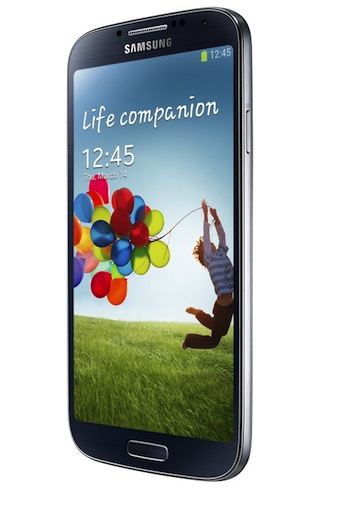Samsung unveiled its Galaxy S4 smartphone in New York City on Thursday night using the theme of a Broadway musical, but almost completely avoided any mention of the Android OS inside the new device.

"Android doesn't matter anymore, right?" said Gartner analyst Carolina Milanesi, pointing to the lack of attention to Android 4.2.2, which the S4 runs. "What matters to Samsung is differentiation from other Android products and making [the] Galaxy S4 clearly from Samsung."
Pre-event hardware and software details were almost all confirmed, including a larger, removable 2,600 mAh battery (up from 2,100 mAh in the Galaxy S III) and a 5-in. full HD Super AMOLED display with a super-high pixel-per-inch count of 441. (The previous model has a 4.8-in screen.)
Software features like Smart Pause and Smart Scroll were also announced; both use an infrared gesture sensor in the S4 to stop a video when looking away or to advance text on a Web page without touching the screen. A separate sensor in the device will be able to read temperature and humidity.
But the unspoken revelation of the evening was Samsung's intention to build its own ecosystem for smartphones apart from Android, Milanesi and other analysts said. "Samsung has grown up and is playing as the big guy, moving away from Android," she said.
Kevin Burden, an analyst at Strategy Analytics, agreed that Android was clearly down-played, and said the word wasn't uttered once from onstage. "It almost feels like Samsung is trying to set up Tizen as its next OS instead of Android," he said.
Tizen is a Linux-based OS backed by Intel, Samsung, Fujitsu and Huawei. Demo phones have been shown off by Samsung, but various reviewers have found them to need more polish before a full release.
Burden suggested that it would be much easier for Samsung to take full control of Tizen as a smartphone OS. "We know that Samsung tried a number of different times to use the Bada OS, so obviously they haven't lost the intention or desire to have more control over their platforms."
Burden and Ramon Llamas, an analyst at IDC, said that for the S4, the emphasis was on features a consumer would want.
"A lot of the features announced were evolutionary and not a huge leap forward, but it's extremely difficult to make a huge leap with smartphones," he said.
Even so, the S4 "is still on the edge of innovation, along with the HTC One and the Nokia Lumia 920," said Llamas.
Llamas said it's possible that millions of Galaxy S4s will be sold. "It definitely puts Apple and other vendors on notice," he said.
BlackBerry has been put on notice as well, Llamas said, since dual-personality features are included in the S4 because of Samsung's introduction of Knox technology based on SAFE (Samsung For Enterprise). With the dual-personality approach, a worker can safeguard company data on a separate area of the S4, something the BlackBerry has included in the Z10. The Z10 goes on sale in the U.S. next Friday through AT&T.
Samsung said the S4 will go on sale in the U.S. sometime in the second quarter, and on 327 carriers in 155 countries at the end of April. AT&T, Sprint, T-Mobile USA and Verizon Wireless will carry it, Samsung said, and Sprint confirmed it will have it in the second quarter. Pricing has not been announced, but analysts presume it will sell for $200 with a two-year contract.
In addition to gesture capabilities, another unusual feature allows the 13-megapixel rear camera and the 2-megapixel front camera to be used simultaneously during a video chat, with the two images presented within windows.
The S4 is slightly slimmer and lighter than the S III, although both look much the same. The S4 is 5.38 x 2.71 x 0.31 inches and weighs 4.6 ounces. It will come in black or white.




